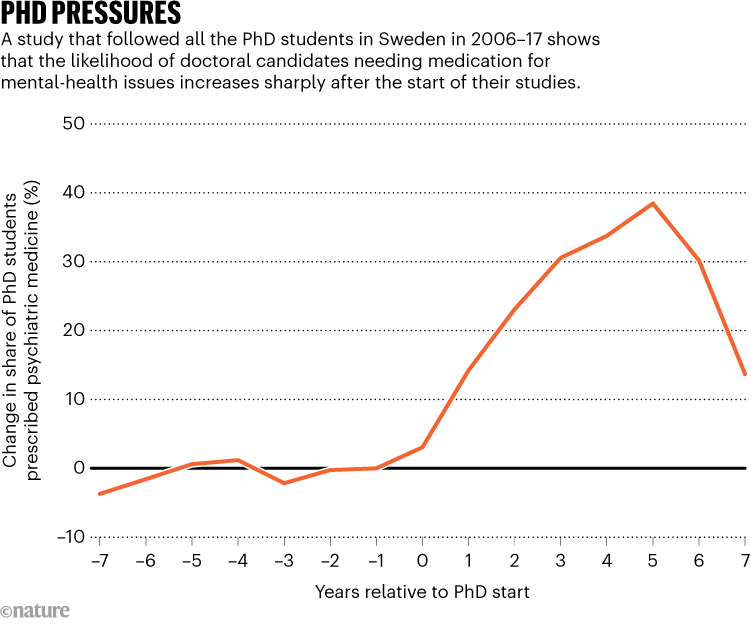
The pressure to collect data, generate results and find jobs can be overwhelming for doctoral researchers.Credit: PeopleImages/Getty
A study of Swedish PhD candidates has shown the vast toll that doctoral studies can take on mental health. The survey adds robust data to discussions about the mental-health crisis in academia. Studies and anecdotal evidence have long shown that PhD students can experience immense pressure to publish and to find funding and jobs in a brutally competitive landscape.
The analysis looked at the rates at which all Swedish PhD students were prescribed psychiatric drugs and were hospitalized for mental-health problems. It found that, on average, the longer they were doing doctoral studies the more they needed to access such services. By the fifth year of studies, the likelihood that PhD candidates needed mental-health medications had increased by 40%, compared with the year before study (see ‘PhD pressures’).
The study indicates that psychological health issues are “systemic and have been plaguing academia for many decades”, says Wendy Ingram, founder of Dragonfly Mental Health, a global non-profit advocacy group in Bradenton, Florida. “Very few studies have looked at objective measures of mental health,” says Ingram.

Source: Ref. 1
Using Swedish administrative records from 2006–17, the authors tracked more than 20,000 PhD students before and after they started their programmes. This allowed the team to assess the direct effect of doctoral studies on students’ mental health, says Eva Ranehill, a behavioural economist at University of Gothenburg, Sweden, and study co-author. The preprint1, which is not yet peer-reviewed, was posted on the server SSRN.
Mental-health medications
The researchers compared the rate at which PhD students, people with master’s degrees and a sample of the general population accessed mental-health services. Before starting a PhD, students and people with master’s degrees used these services at similar rates. But use of psychiatric medicines, such as antidepressants and sedatives, increased among PhD students year-on-year during their studies. This peaked in the fourth and fifth years — the average length of a PhD programme in most countries — then fell in the sixth and seventh years.
Those at highest risk of being prescribed psychiatric medication during PhD studies were women and people who’d taken such medicines before starting their programme.
The authors found a similar pattern when they compared PhD students with a sample of the general population aged 18–70. Before beginning their programmes, PhD candidates used mental-health services less frequently than the general population, but by the end of their studies, the rates were the same.
A mental-health crisis is gripping science — toxic research culture is to blame
The study raises the question of whether academic environments are more intense than other sectors. Surveys2,3 suggest that levels of anxiety and depression are higher among PhD students than the general population, but Ranehill says that it’s too early to know whether these conditions occur more often in PhD students than in those with similarly demanding occupations. “We will start to address the different mental-health outcomes across different job sectors in future analysis of the Swedish data set,” she says.
Pressures build
The study found that uptake in medication varied across academic fields. Those in natural sciences saw a 100% increase by the fifth year compared with pre-PhD levels, whereas those in the humanities and social sciences saw 40% and 50% increases, respectively. Medical students didn’t see any uptick in prescriptions.
Differing norms in disciplines might explain this, says Ranehill: “In some fields, you’re very dependent on your supervisor. In others, you’re more isolated. Many senior people do a lot to help, but some do the opposite.”
Rituja Bisen, a fifth-year PhD student in neurobiology at the University of Würzburg in Germany, says that the pressure to get grants and publish papers affects people. “You need to generate data as quickly as possible, and the feeling of competition for funding and jobs can be very strong, even early in your PhD.”
Mental health of graduate students sorely overlooked
Bisen, who has also dealt with the added — and common — stress of moving countries for her PhD, says that she was lucky to have strong support from her principal investigator and department. But some of her friends in other departments struggled. “It doesn’t matter how good a lab is; if it’s coming out of a toxic work culture, it isn’t worth it in the long run.”
Dragonfly, formed by volunteer academics in 2019, is piloting programmes to foster excellent mental health in 22 countries for more than 50,000 academics at different career stages. The programmes involve training with evidence-based approaches to improve mental health, and the group will publish results in 2026.
Bisen says finding support networks in and out of the laboratory has helped her to safeguard her mental health. “I got into bouldering with a group of fellow biologists. We talk about stress and blow off steam. It’s like a support group.”




